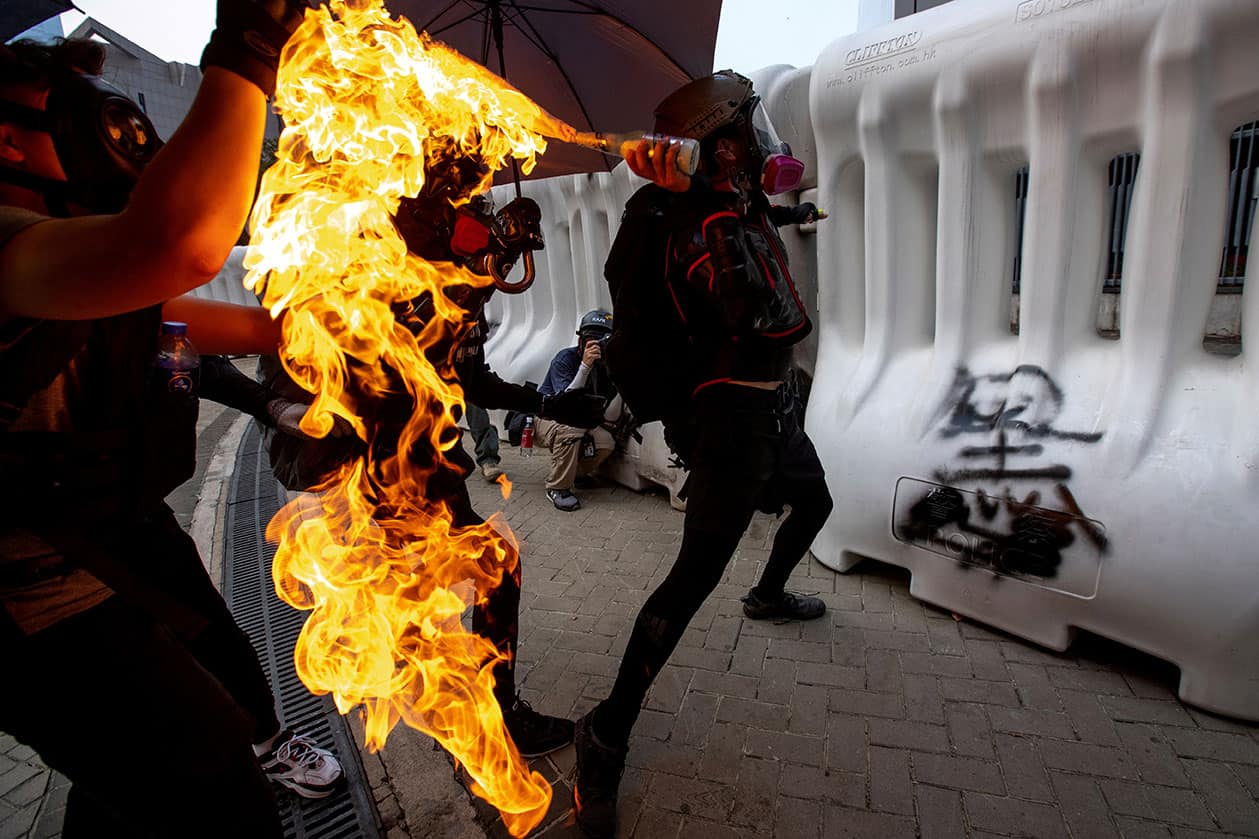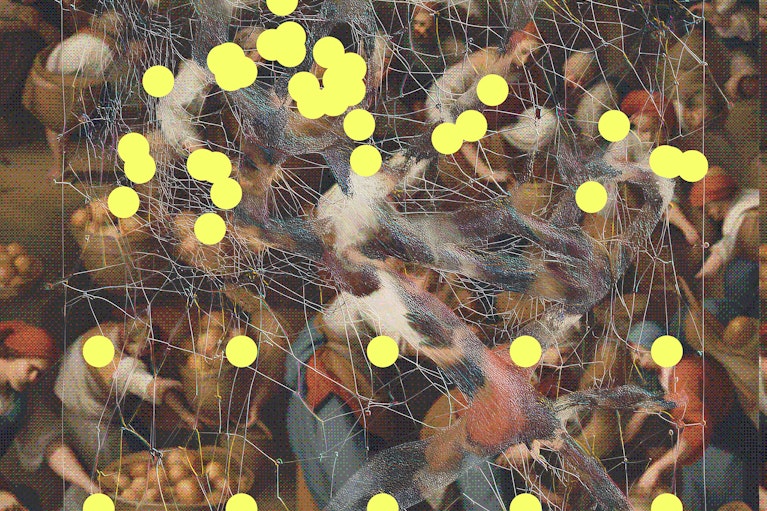Chandran Nair is the founder and CEO of the Global Institute for Tomorrow and the author of The Sustainable State: The Future of Government, Economy and Society.
HONG KONG — History is full of examples of when, in times of social unrest, a calm and peaceful society can quickly devour itself in just a few days or weeks. The peace people take for granted can be surprisingly fragile. Dark prejudices can be triggered with catastrophic results.
Hong Kong’s months-long protests started peacefully but have since taken a turn toward more radical and violent action. Street clashes, the use of petrol bombs, vandalism and targeted arson have become common occurrences. There is a real danger that Hong Kong descends into a protracted period of lawlessness and social instability as the government loses control, a generation of young people is deprived of hope and those with financial means relocate.
One element of the protest movement has been particularly troubling and perhaps a warning of things to come: an anti-mainland Chinese sentiment expressed through verbal harassment, doxxing, targeted vandalism and, in the worst cases, violence. Businesses are being targeted based on poorly substantiated claims (the supermarket chain Best Mart 360, for example) or even just associations with mainland China (like the technology company Xiaomi). Several mainland Chinese have expressed to me their fear about living in the city; they are now planning for an eventual exit.
“A calm and peaceful society can devour itself in just a few days or weeks.”
If Hong Kong is to remain an open and pluralistic society, this targeted violence has to stop and the population must learn to live alongside people with a broad range of backgrounds and viewpoints.
Three trends are particularly concerning. If these trends are allowed to continue, Hong Kong risks losing all pretense of being an open and pluralistic society that tolerates a wide range of views — something that many people, both in and outside of the city, want to protect.
The first is the ugly intolerance and bigotry against mainland Chinese living in Hong Kong who, even before the protests, were seen as a proxy for a whole range of social ills. This has no place in a pluralistic society that aspires to be a beacon of democracy and the rule of law.
There are reports of mainland Chinese who have lived here for over a decade deciding to leave as they and their children are harassed. Many now avoid speaking Mandarin in public and even avoid certain restaurants. Chinese professionals have been targeted at work: one widely shared video saw a mainland businessman cornered on the street and punched in the middle of Central, the main business district, during a major protest.
“The real danger is that Hong Kong descends into a protracted period of lawlessness and social instability.”
Dark, anti-foreigner sentiments stirred by citizens or supported by governments have happened before: to Jews in Europe, Indians in East Africa, Chinese in Indonesia, Bangladeshis in the U.K., Hispanics in the United States and many others elsewhere. In those situations, not enough people spoke up until it was too late — the rest is history. Imagine the widespread denunciations if protestors in, say, Catalonia were seen harassing and attacking non-Catalans? Or if Australian Muslims were attacked in Sydney or white South Africans were attacked in Cape Town? It is one thing to dislike the Chinese government or the Communist Party, but to harass and attack individuals is unconscionable.
It would be remiss to ignore the violence — including non-state violence — against some protestors and activists. Protestors have been attacked by groups supporting the government, and pro-democracy activists — like Jimmy Sham of the Civil Human Rights Front — have been deliberately targeted.
But this violence should not be used to rationalize what a subset of protestors are doing to people and organizations just because they are from mainland China. Recriminations like this ultimately tear societies apart and must be closed off to prevent things from spiraling out of control. There are signs that other acts of racism may spread and target minorities — it has been suggested that the shameless attack on Sham was by a group of South Asians.
“Violence by pro-Beijing forces should not be used to rationalize what a subset of protestors are doing to people and organizations just because they are from mainland China.”
The second trend is a rise of a form of “soft terror” — “are you with us or against us?” Protestors have color-coded restaurants and businesses: yellow if they support the protests, blue if they support the police, red to encourage “decoration” (spray-painting) and black to target for “renovation” (vandalism). The reasons why a business can be deemed “anti-protest” are expanding. Despite releasing no statements on the protests, both the Bank of China and Xiaomi were targeted for vandalism and arson recently only because they were mainland companies. Best Mart 360 has claimed that more than 50 of its outlets have been attacked; the chain is a target due to unsubstantiated accusations that it has ties to “Fujian gangs.”
The third trend is a chilling of discourse in the city. Stress levels in Hong Kong are at an all-time high. Doxxing, both of pro-protestor and pro-government figures, has become a real threat. Social media comments that question the protests have resulted in individuals being targeted, including their families.
A real fear of sharing one’s view has gripped many parts of the city — and not just by those who support the protestors. I know of someone who put an innocent comment on Facebook questioning protestors’ actions and was informed by a friend that he and the school his child attended had been identified. The families of police officers have had their details revealed in the same way. Even if actions from the protest movement are more widespread, suppression of opinions is occurring on both sides — a woman who works in the financial sector for a mainland Chinese company in Hong Kong wrote pro-protest posts on Facebook, and her career now hangs in the balance. This would not be tolerated by the public in any developed nation.
All of this has sown seeds of deep mistrust between ordinary people in the city. Old friendships are being broken, workplaces are deeply divided, family units are being torn apart. These wounds are deep and will take a long time to heal. It has also begun to undermine the credibility of the protest movement and even created splits within it.
“It is time that all stakeholders took a step back from the abyss to prevent the dawn of a darkness that will engulf the city.”
Hong Kong is a unique city. Its core values are worth preserving, especially as an autonomous Chinese city with strong rule of law and international connections. The protests have revealed deep flaws in how the city is governed. But ironically they have resulted in lawlessness and sown fear in the hearts of its citizens.
It is true that Beijing has made things more difficult for itself by sometimes conflating being Chinese with supporting Beijing’s policies. However, the protest movement specifically and the wider public in general are overreaching and hurting the otherwise strong case for self-determination by embracing or at least tolerating violence. Hong Kongers are losing the moral high ground in the court of global public opinion the longer this goes on, and thereby potentially inviting a stronger response from Beijing. If these trends fester, they will also ultimately harm Hong Kong in the long run and sadly defeat the original purpose of the protests: to build a global city that retains its unique position as a beacon of democracy and that benefits from being integrated with the world’s second-largest economy.
Wider Hong Kong society — not just the government — is currently proving unable to cope with the current protests. This is somewhat understandable — like many former colonies, Hong Kong is politically underdeveloped. It is time that all stakeholders took a step back from the abyss to prevent the dawn of a darkness that will engulf the city and from which it might not recover for a long time. It is also time that mediators, both local and foreign, get engaged to find a constructive path out of the crisis.
Open societies require open-mindedness, a willingness to compromise and respect for people with different backgrounds and viewpoints.





